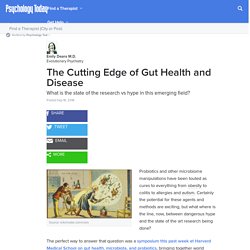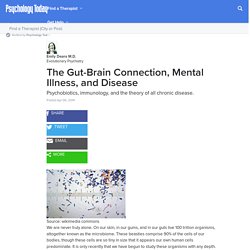

Gut issues are only one piece of the puzzle in chronic illness; do not rely only on what you find here. Also seek out medical help if you are ill.
Studies: Mice aren't people. Studies based on what people remembered eating in the past aren't that accurate. Controlled studies in nutrition are hard to do. Sometimes researchers overstate their findings or are unaware of confounding factors. Occasionally studies have conflicting results with others. Keep that in mind when reading the results.
Children, Babies, Pregnancy and Birth, and the Gut Microbiome.
Allergies and the Gut Microbiome. Arthritis (non-Rheumatoid) Asthma. Autism. Autoimmune Disorders / The Immune System and the Gut Microbiome. Bone Health and the Gut Microbiome. Brain Health, Mental Health and the Gut Microbiome. Cancer and the Microbiomes.
Chronic Fatigue Syndrome (CFS) / Myalgic Encephalomyelitis (ME) and the Gut Microbiome. Constipation. COVID-19 and the Gut Microbiome. Cystic Fibrosis and the Gut Microbiome. Diabetes, Insulin Resistance and the Gut Microbiome.
Gallbladder. GERD (Acid Reflux)/ Stomach Problems. Gluten Sensitivity and the Gut Microbiome. Heart Health and the Gut Microbiome. High Blood Pressure, Stroke and the Gut Microbiome. The Gut Microbiome and Immunity. Inflammatory Bowel Disease, Crohn's, Colitis, and IBS. Inflammation and the Gut Microbiome. Kidney Disease. Leaky Gut / Endotoxemia. Liver Disease. The Gut Microbiome and Mitochondria. Multiple Sclerosis and the Gut Microbiome. Obesity, Weight Loss and the Gut Microbiome.
Restless Legs and the Gut Microbiome. SIBO (Small Intestine Bowel Overgrowth), SIFO and Dysbiosis. Skin Health and the Gut Microbiome. Sleep, Circadian Rhythm and the Gut Microbiome. Stress, PTSD, and the Gut Microbiome. Low Testosterone and the Gut. Thyroid and the Gut Microbiome. Trauma and Injury. The Gut Microbiome and the Vagus Nerve. The Gut Connection – ! How Biofilms, LPS and Intestinal Permeability Influence Systemic Inflammation.
Awesome presentation that pulls so many things together. – kiraonysko
Gut Inflammation: 12 Causes (and 12 Effects) I’ve previously discussed how your gut microbiome influences essentially every aspect of your health.

However, gut inflammation is also a crucial determinant of intestinal and whole-body health. Read on to learn how various diet and lifestyle factors cause gut inflammation, the health consequences of a chronically inflamed gut, and practical strategies for alleviating inflammation and restoring gut health. Gut inflammation can contribute to the development of a wide range of serious conditions like type 2 diabetes, Parkinson’s disease, cardiovascular disease, and more.
Find out what causes inflammation and what you can do to correct it. #optimalhealth #chriskresser. 7 Signs Your Gut Bacteria Are Out of Whack. How holobionts get sick—toward a unifying scheme of disease. The Cutting Edge of Gut Health and Disease. Source: wikimedia commons Probiotics and other microbiome manipulations have been touted as cures to everything from obesity to colitis to allergies and autism.

Certainly the potential for these agents and methods are exciting, but what where is the line, now, between dangerous hype and the state of the art research being done? The Gut-Brain Connection, Mental Illness, and Disease. Source: wikimedia commons We are never truly alone.

On our skin, in our gums, and in our guts live 100 trillion organisms, altogether known as the microbiome. These beasties comprise 90% of the cells of our bodies, though these cells are so tiny in size that it appears our own human cells predominate. It is only recently that we have begun to study these organisms with any depth.